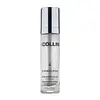What's inside
What's inside
 Key Ingredients
Key Ingredients

 Benefits
Benefits

 Concerns
Concerns

 Ingredients Side-by-side
Ingredients Side-by-side

Hyaluronic Acid
HumectantHydrolyzed Sodium Hyaluronate
Skin ConditioningSodium Hyaluronate
HumectantSodium Hyaluronate Crosspolymer
HumectantHydroxypropyltrimonium Hyaluronate
C12-13 Alkyl Glyceryl Hydrolyzed Hyaluronate
Superoxide Dismutase
AntioxidantSaccharomyces Polypeptides
Skin ConditioningPalmitoyl Tetrapeptide-7
Skin ConditioningPalmitoyl Tripeptide-5
Skin ConditioningPalmitoyl Tripeptide-1
Skin ConditioningAcetyl Octapeptide-3
HumectantCeramide Ns
Skin ConditioningSaccharomyces/Copper Ferment
Skin ConditioningSaccharomyces/Zinc Ferment
Skin ConditioningSaccharomyces/Manganese Ferment
Skin ConditioningRiboflavin
Cosmetic ColorantPhospholipids
Skin ConditioningFolic Acid
Skin ConditioningEnteromorpha Compressa Extract
Skin ProtectingGlycoproteins
Skin ConditioningGinkgo Biloba Leaf Extract
Skin ConditioningSerine
MaskingProline
Skin ConditioningAlanine
MaskingGlutamic Acid
HumectantNiacinamide
SmoothingParfum
MaskingCaprylyl Glycol
EmollientEthylhexylglycerin
Skin ConditioningUndecylenoyl Glycine
CleansingCapryloyl Glycine
CleansingHyaluronic Acid, Hydrolyzed Sodium Hyaluronate, Sodium Hyaluronate, Sodium Hyaluronate Crosspolymer, Hydroxypropyltrimonium Hyaluronate, C12-13 Alkyl Glyceryl Hydrolyzed Hyaluronate, Superoxide Dismutase, Saccharomyces Polypeptides, Palmitoyl Tetrapeptide-7, Palmitoyl Tripeptide-5, Palmitoyl Tripeptide-1, Acetyl Octapeptide-3, Ceramide Ns, Saccharomyces/Copper Ferment, Saccharomyces/Zinc Ferment, Saccharomyces/Manganese Ferment, Riboflavin, Phospholipids, Folic Acid, Enteromorpha Compressa Extract, Glycoproteins, Ginkgo Biloba Leaf Extract, Serine, Proline, Alanine, Glutamic Acid, Niacinamide, Parfum, Caprylyl Glycol, Ethylhexylglycerin, Undecylenoyl Glycine, Capryloyl Glycine
Water
Skin ConditioningSodium Hyaluronate
HumectantHydrolyzed Glycosaminoglycans
HumectantHydrolyzed Manihot Esculenta Tuber Extract
Skin ConditioningButylene Glycol
HumectantGlycerin
HumectantAcrylic Acid
Laureth-23
CleansingDimethicone
EmollientDextran
Trifluoroacetyl Tripeptide-2
Skin ConditioningCarbomer
Emulsion StabilisingPolysorbate 20
EmulsifyingPalmitoyl Oligopeptide
CleansingPalmitoyl Tetrapeptide-7
Skin ConditioningPropanediol
SolventOrnithine
Skin ConditioningPhospholipids
Skin ConditioningGlycolipids
Skin ConditioningHydrolyzed Soy Flour
Skin ConditioningDimer Tripeptide-43
Sorbitol
HumectantYeast Extract
Skin ConditioningPEG-40 Hydrogenated Castor Oil
EmulsifyingEthylhexylglycerin
Skin ConditioningSodium Polyacrylate
AbsorbentPotassium Sorbate
PreservativePhenoxyethanol
PreservativeParfum
MaskingMethyl Di-T-Butyl Hydroxyhydrocinnamate
AntioxidantCI 15985
Cosmetic ColorantCI 17200
Cosmetic ColorantWater, Sodium Hyaluronate, Hydrolyzed Glycosaminoglycans, Hydrolyzed Manihot Esculenta Tuber Extract, Butylene Glycol, Glycerin, Acrylic Acid, Laureth-23, Dimethicone, Dextran, Trifluoroacetyl Tripeptide-2, Carbomer, Polysorbate 20, Palmitoyl Oligopeptide, Palmitoyl Tetrapeptide-7, Propanediol, Ornithine, Phospholipids, Glycolipids, Hydrolyzed Soy Flour, Dimer Tripeptide-43, Sorbitol, Yeast Extract, PEG-40 Hydrogenated Castor Oil, Ethylhexylglycerin, Sodium Polyacrylate, Potassium Sorbate, Phenoxyethanol, Parfum, Methyl Di-T-Butyl Hydroxyhydrocinnamate, CI 15985, CI 17200
 Reviews
Reviews

Alternatives
Ingredients Explained
These ingredients are found in both products.
Ingredients higher up in an ingredient list are typically present in a larger amount.
Ethylhexylglycerin (we can't pronounce this either) is commonly used as a preservative and skin softener. It is derived from glyceryl.
You might see Ethylhexylglycerin often paired with other preservatives such as phenoxyethanol. Ethylhexylglycerin has been found to increase the effectiveness of these other preservatives.
Palmitoyl Tetrapeptide-7 (formerly Palmitoyl Tetrapeptide-3) is a lab-made peptide with anti-inflammatory and skin-repairing benefits. It's made up of four amino acids (glycine, glutamine, proline, and arginine) and palmitic acid (which helps it penetrate skin more effectively).
This ingredient helps reduce inflammation by limiting the production of interleukin-6 (IL-6), a chemical that triggers inflammatory responses, particularly after UV exposure.
Less inflammation = slower collagen breakdown and a longer-lasting, youthful appearance.
Palmitoyl Tetrapeptide-7 also stimulates collagen production and supports a healthier skin barrier.
Over time, this can improve skin firmness, hydration, and reduce the appearance of fine lines. It’s commonly paired with Palmitoyl Tripeptide-1 in the well-known Matrixyl 3000 complex for enhanced anti-aging effects.
This ingredient has been shown to be effective and safe in cosmetic use and you'll typically find it in small amounts (less than 0.01%).
Due to its palmitic acid base, it may not be safe for Malassezia folliculitis.
Read more about other common types of peptides here:
Learn more about Palmitoyl Tetrapeptide-7Parfum is a catch-all term for an ingredient or more that is used to give a scent to products.
Also called "fragrance", this ingredient can be a blend of hundreds of chemicals or plant oils. This means every product with "fragrance" or "parfum" in the ingredients list is a different mixture.
For instance, Habanolide is a proprietary trade name for a specific aroma chemical. When used as a fragrance ingredient in cosmetics, most aroma chemicals fall under the broad labeling category of “FRAGRANCE” or “PARFUM” according to EU and US regulations.
The term 'parfum' or 'fragrance' is not regulated in many countries. In many cases, it is up to the brand to define this term.
For instance, many brands choose to label themselves as "fragrance-free" because they are not using synthetic fragrances. However, their products may still contain ingredients such as essential oils that are considered a fragrance by INCI standards.
One example is Calendula flower extract. Calendula is an essential oil that still imparts a scent or 'fragrance'.
Depending on the blend, the ingredients in the mixture can cause allergies and sensitivities on the skin. Some ingredients that are known EU allergens include linalool and citronellol.
Parfum can also be used to mask or cover an unpleasant scent.
The bottom line is: not all fragrances/parfum/ingredients are created equally. If you are worried about fragrances, we recommend taking a closer look at an ingredient. And of course, we always recommend speaking with a professional.
Learn more about ParfumPhospholipids are naturally found in our skin as they are the main component of cell membranes. Phospholipids have humectant, emollient, antioxidant properties.
Phospholipids are complex lipids that contain glycerin, two fatty acids, and a phosphate group. Some foods that contain phospholipids include soybeans and milk. The phospholipids found in soy come from Lecithin. This ingredient can also be synthetically created.
Due to their hygroscopic nature, they act as both humectants and emollients. Humectants draw moisture from the air to your skin, while emollients help trap moisture in.
The phospholipids in our skin can be naturally depleted. Replenishing the phospholipids in our skin can help hydrate your skin.
Studies show phospholipids display antioxidant activity and may help with reducing the signs of aging.
This ingredient is non-occlusive.
Some types of phospholipids:
Learn more about PhospholipidsSodium Hyaluronate is hyaluronic acid's salt form. It is commonly derived from the sodium salt of hyaluronic acid.
Like hyaluronic acid, it is great at holding water and acts as a humectant. This makes it a great skin hydrating ingredient.
Sodium Hyaluronate is naturally occurring in our bodies and is mostly found in eye fluid and joints.
These are some other common types of Hyaluronic Acid:
Learn more about Sodium Hyaluronate